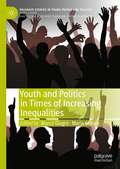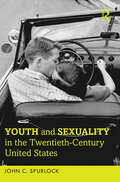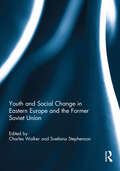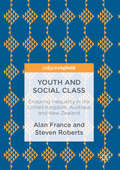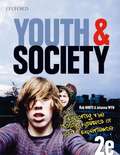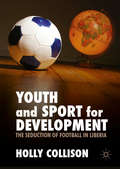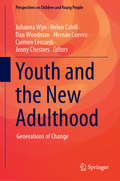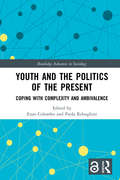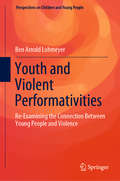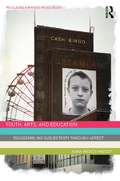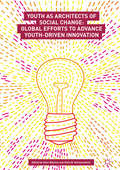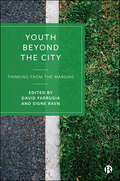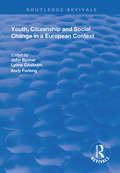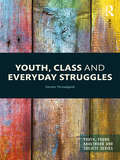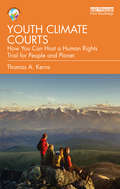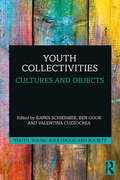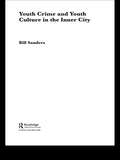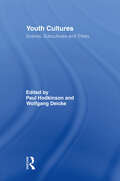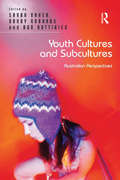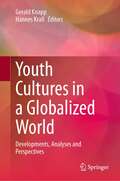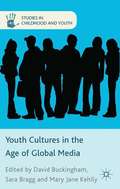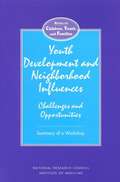- Table View
- List View
Youth and Politics in Times of Increasing Inequalities (Palgrave Studies in Young People and Politics)
by Marco Giugni Maria GrassoYoung people are very often the driving forces of political participation that aims to change societies and political systems. Rather than being depoliticized, young people in different national contexts are giving rise to alternative politics. Drawing on original survey data collected in 2018, this edited volume provides a detailed analysis of youth participation in nine European countries by focusing on socialization processes, different modes of participation and the mobilization of youth politics. "This volume is an indispensable guide to understanding young European’s experience and engagement of politics, the inequalities that shape young people’s political engagement and are sometimes replicated through them, and young people’s commitment to saving the environment and spreading democratic ideals. Based on compelling and extensive research across nine nations, this volume makes important advances in key debates on youth politics and provides critical empirical insights into which young people engage, influences on young people’s politics, how young people engage, why some young people don’t engage, and trends across nations. The volume succeeds in the herculean task of focusing on specific national contexts while also rendering a comprehensive picture of youth politics and inequality in Europe today."—Jennifer Earl, Professor of Sociology, University of Arizona, USA "Forecasts by social scientists of young people’s increasingly apathetic stance towards political participation appear to have been misplaced. This text, drawing data and analysis across and between nine European countries, captures the changing nature of political ‘activism’ by young people. It indicates how this is strongly nuanced by factors such as social class and gender identity. It also highlights important distinctions between young people’s approaches towards more traditional (electoral) and more contemporary (non-institutional) forms of participation. Critically, it illuminates the many ways in which youth political participation has evolved and transformed in recent years. Wider social circumstances and experiences are identified as highly significant in preparing young people for, and influencing their levels of participation in, both protest-oriented action and electoral politics."—Howard Williamson, Professor of European Youth Policy, University of South Wales, UK "This book is an incredible guide to understanding the role and sources of inequalities on young people’s political involvement. Country specific chapters allow the authors to integrate a large number of the key and most pressing issues regarding young people’s relationship to politics in a single volume. Topics range from social mobility and the influence of socioeconomic (parental) resources and class; young people’s practice in the social sphere; the intersection of gender with other sources of inequalities; online participation and its relationship with social inequalities; the impact of harsh economic conditions; the mobilization potential of the environmental cause; to the role of political organizations. Integrating all these pressing dimensions in a common framework and accompanying it with extensive novel empirical evidence is a great achievement and the result is a must read piece for researchers and practitioners aiming to understand the challenges young people face in developing their relationship to politics."—Gema García-Albacete, Associate Professor of Political Science, University Carlos III Madrid, Spain
Youth and Sexuality in the Twentieth-Century United States
by John C. SpurlockWhen did the sexual revolution happen? Most Americans would probably say the 1960s. In reality, young couples were changing the rules of public and private life for decades before. By the early years of the twentieth century, teenagers were increasingly free of adult supervision, and taking control of their sexuality in many ways. Dating, going steady, necking, petting, and cohabiting all provoked adult hand-wringing and advice, most of it ignored. By the time the media began announcing the arrival of a ‘sexual revolution,’ it had been going on for half a century. Youth and Sexuality in the Twentieth-Century United States tells this story with fascinating revelations from both personal writings and scientific sex research. John C. Spurlock follows the major changes in the sex lives of American youth across the entire century, considering how dramatic revolutions in the culture of sex affected not only heterosexual relationships, but also gay and lesbian youth, and same-sex friendships. The dark side of sex is also covered, with discussion of the painful realities of sexual violence and coercion in the lives of many young people. Full of details from first-person accounts, this lively and accessible history is essential for anyone interested in American youth and sexuality.
Youth and Social Change in Eastern Europe and the Former Soviet Union
by Charles Walker Svetlana StephensonTwo decades have now passed since the revolutions of 1989 swept through Eastern Europe and precipitated the collapse of state socialism across the region, engendering a period of massive social, economic and political transformation. This book explores the ways in which young people growing up in post-socialist Eastern Europe and the former Soviet Union negotiate a range of identities and transitions in their personal lives against a backdrop of thoroughgoing transformation in their societies. Drawing upon original empirical research in a range of countries, the book's contributors explore the various freedoms and insecurities that have accompanied neo-liberal transformation in post-socialist countries - in spheres as diverse as consumption, migration, political participation, volunteering, employment and family formation - and examine the ways in which they have begun to re-shape different aspects of young people's lives. In addition, while 'social change' is a central theme of the issue, all of the chapters in the collection indicate that the new opportunities and risks faced by young people continue both to underpin and to be shaped by familiar social and spatial divisions, not only within and between the countries addressed, but also between 'East' and 'West'. This book was originally published as a special issue of Journal of Youth Studies.
Youth and Social Class: Enduring Inequality in the United Kingdom, Australia and New Zealand
by Alan France Steven RobertsThis book addresses the recent marginalisation of class theory in youth sociology. The authors argue for the importance of reinstating class analysis as central to understanding young people’s lives in the United Kingdom, Australia and New Zealand. Their analysis recognises that in periods of social change, class relationships and processes can and do get reconfigured, but by drawing on the work of Pierre Bourdieu, they show that class, while being dynamic, remains core to shaping the everyday lives of young people. Students and scholars across a range of areas including the sociology of youth, sociology of education, social work and social policy will find this book of interest.
Youth and Society
by Rob White Johanna WynBuilding on the strengths of the highly respected first edition, Youth and Society, 2nd edition provides a comprehensive overview of the key issues, research, and theoretical developments in the sociology of youth. A new part, 'Theorising Youth', introduces the many and sometimes conflictingconceptualisations of youth and key theories. Other new chapters explore issues around youth and technology and indigenous youth.
Youth and Sport for Development
by Holly CollisonProcesses of development concerning reconciliation,rehabilitation and peace-building have become a central theme for globalorganizations tasked with intervening in broken and divided societies afterviolent conflicts. What can reunite populations divided by war and violencewhilst attempting to build a peaceful civil society? This book considers theimpact and value of sport, notably football, towards achieving this goal. Using extensive fieldworkfrom Liberia, Collison highlights the multiple and diverse stakeholders andactors aligning themselves with 'Sport for Development and Peace'interventions. By unpacking and conceptualising the ambiguous terminology,complex social effects and the lived experience of SDP, this book draw uponparticipant voices and the author's own lived experience within SDP to gainsymbolic understandings of culture, identity and the formal and informal socialstructures in which participants and interventionsoperate. Collison identifies that SDP has become fashionable withindevelopment agendas but it remains an aspirational image, a notion ofseduction, rather than a tested method of reintegration and youth developmentin post-conflict environments. Youth and Sport for Development questionsthe assumptions of SDP rhetoric and programs, and traces the effects offootball - the favoured vehicle of SDP- on youth in post-conflict Liberia. Examining three core themes: post-conflict development, youth and community,this book centralises the narratives of young football players in Liberia andwill appeal to scholars across Anthropology, Sociology, Sports Studies,Politics and Development.
Youth and Subculture as Creative Force
by Hans Skott-MyhreRadical youth work is gaining popularity as a means of teaching adults how, in collaboration with youth, they can challenge dominant ways of knowing. This study uses two particular subcultures, skinheads and punks, to explore how constructions of subcultures in time, language, space, body practice, and identity offer alternative ways of understanding youth-adult relationships. In doing so, it investigates youth work as a radical political process and suggests a new approach to current subculture theory. In Youth and Subculture as Creative Force, Hans Arthur Skott-Myhre interviews six youths who identify themselves as members of either punk or traditional skinhead subcultures. He discusses the results of these interviews and demonstrates how youth perspectives have come to inform his understanding of himself as a youth worker and scholar. Youth subcultures, he argues, have considerable potential for improving relations between youths and adults in the postmodern capitalist world. Drawing on Marxist, Foucauldian, and postmodernist theory, Skott-Myhre uses the subjective formations outlined in his study to offer recommendations for constructing legitimate radical youth work that takes into account for the perspectives of young people.
Youth and the New Adulthood: Generations of Change (Perspectives on Children and Young People #8)
by Johanna Wyn Jenny Chesters Dan Woodman Helen Cahill Hernán Cuervo Carmen LeccardiThis book investigates the life trajectories of Generation X and Y Australians through the 1990s and 2000s. The book defies popular characterizations of members of the ‘precarious generations’ as greedy, narcissistic and self-obsessed, revealing instead that many of the members of these generations struggle to reach the standard of living enjoyed by their parents, value learning highly and are increasingly concerned about the environment and the legacy current generations are leaving for their children and remain optimistic in the face of considerable challenges. Drawing on data from the Life Patterns longitudinal study of Australian youth (an internationally recognized study), the book tells the story of members of these ‘precarious generations’. It examines significant dimensions of young people’s lives across time, comparing how domains such as health and well-being, education, work and relationships intersect to produce the complex outcomes that characterize the lives of members of each of these generations. It also explores the strategies these generations use to make their lives and the ways in which they remain resilient. While the book is based on Australian data, the analysis draws on and contributes to the international literature on young people and social change.
Youth and the Politics of the Present: Coping with Complexity and Ambivalence (Routledge Advances in Sociology)
by Enzo Colombo Paola RebughiniYouth and the Politics of the Present presents a range of topical sociological investigations into various aspects of the everyday practices of young adults in different European contexts. Indeed, this volume provides an original and provocative investigation of various current central issues surrounding the effects of globalization and the directions in which Western societies are steering their future. Containing a wide range of empirical and comparative examples from across Europe, this title highlights how young adults are trying to implement new forms of understanding, interpretation and action to cope with unprecedented situations; developing new forms of relationships, identifications and belonging while they experience new and unprecedented forms of inclusion and exclusion. Grounding this exploration is the suggestion that careful observations of the everyday practices of young adults can be an excellent vantage point to grasp how and in what direction the future of contemporary Western societies is heading. Offering an original and provocative investigation, Youth and the Politics of the Present will appeal to students and researchers interested in fields such as Youth Studies, Globalization Studies, Migration Studies, Gender Studies and Social Policy.
Youth and Violent Performativities: Re-Examining the Connection Between Young People and Violence (Perspectives on Children and Young People #11)
by Ben Arnold LohmeyerThis book challenges the dominant narrative of young people being a uniquely violent group. Instead, the book critically examines how young people become violent as they enact and resist the available violent performativities in youth. It focuses on the experiences of 28 young people in Australia who are subjected to violence, who use violence and who resist violence. A critical analysis of these young people’s “messy” stories facilitates a reframing of the physical violence routinely attributed to young people as a product of violating systems and structures. The author constructs a converging theoretical landscape to re-examine youth, violence and resistance at the intersection of the sociology of violence and the sociology of youth. Drawing on interviews with young Australians, the book makes a valuable contribution to contemporary international scholarship on youth and violence, while also examining the potential for complicity to violence in youth research and practice. In doing so it offers youth scholars and practitioners a framework for reassessing their theoretical frameworks and methods for studying and working with young people in connection with violence.
Youth, Arts, and Education: Reassembling Subjectivity through Affect (Routledge Advances in Sociology)
by Anna Hickey-MoodyHow are the arts important in young people’s lives? Youth, Arts and Education offers a groundbreaking theory of arts education. Anna Hickey-Moody explores how the arts are ways of belonging, resisting, being governed and being heard. Through examples from the United Kingdom and Australia, Anna Hickey-Moody shows the cultural significance of the kinds of learning that occur in and through arts. Drawing on the thought of Gilles Deleuze, she develops the theory of affective pedagogy, which explains the process of learning that happens through aesthetics. Bridging divides between critical pedagogical theory, youth studies and arts education scholarship, this book: Explains the cultural significance of the kinds of learning that occur in and through arts Advances a theory of aesthetic citizenship created by youth arts Demonstrates ways in which arts practices are forms popular and public pedagogy Critiques popular ideas that art can be used to fix problems in the lives of youth at risk Youth, Arts and Education is the first post-critical theory of arts education. It will be of interest to students and scholars across the social sciences and humanities, in particular in the sociology of education, arts education, youth studies, sociology of the arts and cultural studies.
Youth as Architects of Social Change
by Sheri Bastien Halla B. HolmarsdottirThis edited collection outlines the issues central to youth engagement in research and social innovation. Youth-driven innovation for social change is increasingly recognized as holding potential for the development of sustainable strategies to tackle some of the most pressing global challenges of our time. The contributors provide additional knowledge concerning what actually constitutes an enabling environment, as well as the most effective approaches for engaging youth as architects of change. While sensitive to the need for contextual appropriateness, the volume contributes to the development of shared understandings and frameworks for engaging and spurring youth-driven innovation for social change worldwide. Youth-Driven Social Innovation showcases examples of youth engagement in frugal and reverse innovation worldwide, alongside examples which demonstrate the tremendous potential of South-South learning, but also learning and youth innovation in the Global North. It will be of interest to students and scholars across a range of disciplines including education, sociology, anthropology, public health, and politics.
Youth Beyond the City: Thinking from the Margins
by David Farrugia and Signe RavnThis interdisciplinary collection charts the experiences of young people in places of spatial marginality around the world, dismantling the privileging of urban youth, urban locations and urban ways of life in youth studies and beyond. Expert authors investigate different dimensions of spatiality including citizenship, materiality and belonging, and develop new understandings of the complex relationships between place, history, politics and education. From Australia to India, Myanmar to Sweden, and the UK to Central America, international examples from both the Global South and North help to illuminate wider issues of intergenerational change, social mobility and identity. By exploring young lives beyond the city, this book establishes different ways of thinking from a position of spatial marginality.
Youth, Citizenship and Social Change in a European Context (Routledge Revivals)
by John Bynner Lynne Chisholm Andy FurlongPublished in 1997, this text is built around themes agreed upon for a conference which aimed to set the agenda for youth research over the next decade. These themes are: the shaping of trajectories and biographies - individualization, agency, structure; vulnerable groups excluded and included youth, polarization, marginalization; social construction of identity - identity, culture, gender, ethnicity; political and social participation and citizenship. The book brings together the work of British and Continental researchers.
Youth, Class and Everyday Struggles (Youth, Young Adulthood and Society)
by Steven ThreadgoldThe concept of everyday struggles can enliven our understanding of the lives of young people and how social class is made and remade. This book invokes a Bourdieusian spirit to think about the ways young people are pushed and pulled by the normative demands directed at them from an early age, whilst they reflexively understand that allegedly available incentives for making the ‘right’ choices and working hard – financial and familial security, social status and job satisfaction – are a declining prospect. In Youth, Class and Everyday Struggles, the figures of those classed as 'hipsters' and 'bogans' are used to analyse how representation works to form a symbolic and moral economy that produces and polices fuzzy class boundaries. Further to this, the practices of young people around DIY cultures are analysed to illustrate struggles to create a satisfying and meaningful existence while negotiating between study, work and creative passions. By thinking through different modalities of struggles, which revolve around meaning making and identity, creativity and authenticity, Threadgold brings Bourdieu’s sociological practice together with theories of affect, emotion, morals and values to broaden our understanding of how young people make choices, adapt, strategise, succeed, fail and make do. Youth, Class and Everyday Struggles will appeal to undergraduate and postgraduate students, as well as postdoctoral researchers, of fields including: Youth Studies, Class and Inequality, Work and Careers, Subcultures, Media and Creative Industries, Social Theory and Bourdieusian Theory.
Youth Climate Courts: How You Can Host a Human Rights Trial for People and Planet
by Thomas A. KernsThis book focuses on Youth Climate Courts, a bold new tool that young people in their teens and twenties can use to compel their local city or county government to live up to its human rights obligations, formally acknowledge the climate crisis, and take major steps to address it. Tom Kerns shows how youth climate leaders can form their own local Youth Climate Court, with youth judges, youth prosecuting attorneys, and youth jury members, and put their local city or county government on trial for not meeting its human rights obligations. Kerns describes how a Youth Climate Court works, how to start one, what human rights are, what they require of local governments, and what governmental changes a Youth Climate Court can realistically hope to accomplish. The book offers young activists a brand new, user-friendly, cost-free, barrier-free, powerful tool for forcing local governments to come to terms with their obligation to protect the rights of their citizens with respect to the climate crisis. This book offers a unique new tool to young climate activists hungry for genuinely effective ways to directly move governments to aggressively address the climate crisis.
Youth Collectivities: Cultures and Objects (Youth, Young Adulthood and Society)
by Bjørn SchiermerThis volume seeks to address what its contributors take to be an important lacuna in youth cultural research: a lack of interest in the phenomenon of collectivity and collective aspects of youth culture. It gathers scholars from diverse research backgrounds – ranging from contemporary subculture studies, fan culture studies, musicology, youth transitions studies, criminology, technology and work-life studies – who all address collective phenomena in young lives. Ranging thematically from music experience and festival participation, via soccer fan culture, leisure, street art, youth climate activism, to the design of EU youth policies and Australian government ‘project’ work with young migrants, the chapters develop a variety of approaches to collective aspects to young cultural practices and material cultures. To establish these new approaches, the contributors combine new theories and fresh empirical work; they critically engage with the tradition and they complement or even reconfigure traditional approaches in and around the field. The book will be of interest to researchers in a broad range of areas in and around the field of youth culture studies including post-subculture studies, cultural studies, musicology, fan-culture and youth transition research, but it is also of acute interest for theoretically interested sociologists. The volume offers a new afterword by French sociologist Michel Maffesoli.
Youth, Crime and Justice
by Cyndi BanksYouth, Crime and Justice takes a critical issues approach to analyzing the current debates and issues in juvenile delinquency. It encourages readers to adopt an analytical understanding encompassing not only juvenile crime, but also the broader context within which the conditions of juvenile criminality occur. Students are invited to explore the connections between social, political, economic and cultural conditions and juvenile crime. This book engages with the key topics in the debate about juvenile justice and delinquency: juvenile institutions delinquency theories gender and race youth and moral panic restorative justice youth culture and delinquency. It clearly examines all the important comparative and transnational research studies for each topic. Throughout, appropriate qualitative studies are used to provide context and explain the theories in practice, conveying a powerful sense of the experience of juvenile justice. This accessible and innovative textbook will be an indispensable resource for senior undergraduates and postgraduates in criminology, criminal justice and sociology.
Youth Crime and Youth Culture in the Inner City (Routledge Advances in Sociology)
by Bill SandersYouth Crime and Youth Culture in the Inner City offers an interpretive account of juvenile delinquency within the modern inner city, an environment which is characterized by a long history of social deprivation and high rates of crime. A wide range of topics are explored, such as young people's motivation for, frequency of, and attitudes towards, a variety of illegal behaviors, such as street robbery, burglary, theft, drug use, drug selling and violence. Why do young people commit these offences? Who do they commit them against? How do they feel afterwards? This book attempts to answer these important theoretical questions, utilizing ethnographic research collected over a seven year period and based around the London inner city borough of Lambeth.
Youth Culture and Social Change
by Keith Gildart Anna Gough-Yates Sian Lincoln Bill Osgerby Lucy Robinson John Street Peter Webb Matthew WorleyThis book brings together historians, sociologists and social scientists to examine aspects of youth culture. The book's themes are riots, music and gangs, connecting spectacular expression of youthful disaffection with everyday practices. By so doing, Youth Culture and Social Change maps out new ways of historicizing responses to economic and social change: public unrest and popular culture.
Youth Cultures: Scenes, Subcultures and Tribes (Routledge Advances in Sociology #10)
by Paul Hodkinson Wolfgang DeickeYouth Cultures offers a comprehensive outline of youth cultural studies in the twenty-first century, with reference to a range of new research case studies. Featuring both well known and emerging scholars from the UK, the US and mainland Europe, the book addresses core theoretical and methodological developments before going on to examine key substantive themes in the study of young people's identities and lifestyles. These include questions of commerce, power and politics, issues of gender and ethnicity, uses of place and space and impacts of new media and communications. Simultaneously offering an accessible introduction and a range of new contributions to the subject area, Youth Cultures will appeal to both students and academics within a range of disciplines, including sociology, media and cultural studies, youth studies and popular music studies.
Youth Cultures and Subcultures: Australian Perspectives
by Brady Robards Sarah BakerThis volume critically examines ’subculture’ in a variety of Australian contexts, exploring the ways in which the terrain of youth cultures and subcultures has changed over the past two decades and considering whether ’subculture’ still works as a viable conceptual framework for studying youth culture. Richly illustrated with concrete case studies, the book is thematically organised into four sections addressing i) theoretical concerns and global debates over the continued usefulness of subculture as a concept; ii) the important place of ’belonging’ in subcultural experience and the ways in which belonging is played out across an array of youth cultures; iii) the gendered experiences of young men and women and their ways of navigating subcultural participation; and iv) the ethical and methodological considerations that arise in relation to researching and teaching youth culture and subculture. Bringing together the latest interdisciplinary research to combine theoretical considerations with recent empirical studies of subcultural experience, Youth Cultures and Subcultures will appeal to scholars and students across the social sciences.
Youth Cultures in a Globalized World: Developments, Analyses and Perspectives
by Hannes Krall Gerald KnappThis book examines the relation between the phenomenon of globalization, changes in the lifeworld of young people and the development of specific youth cultures. It explores the social, political, economic and cultural impact of globalization on young people. Growing diversity in their lifeworlds, technological development, migration and the ubiquity of digital communication and representation of the world open up new forms of self-representation, networking and political expression, which are described and discussed in the book. Other topics are the impact of globalization on work and economy, global environmental issues such as climate change, political movements which put “nationalism first”, change of youth`s values and the significance of body, gender and beauty. The book highlights the challenges of young people in modern life, as well as the way in which they express themselves and engage in society – in culture, politics, work and social life.
Youth Cultures in the Age of Global Media
by David Buckingham Sara Bragg Mary Jane KehilyThis book explores the impact of globalisation and new technologies on youth cultures around the world, from the Birmingham School to the youthscapes of South Korea. In a timely reappraisal of youth cultures in contemporary times, this collection profiles the best of new research in youth studies written by leading scholars in the field.
Youth Development and Neighborhood Influences: Challenges and Opportunities Summary of a Workshop
by Committee on Youth DevelopmentA report on Youth Development and Neighborhood Influences
